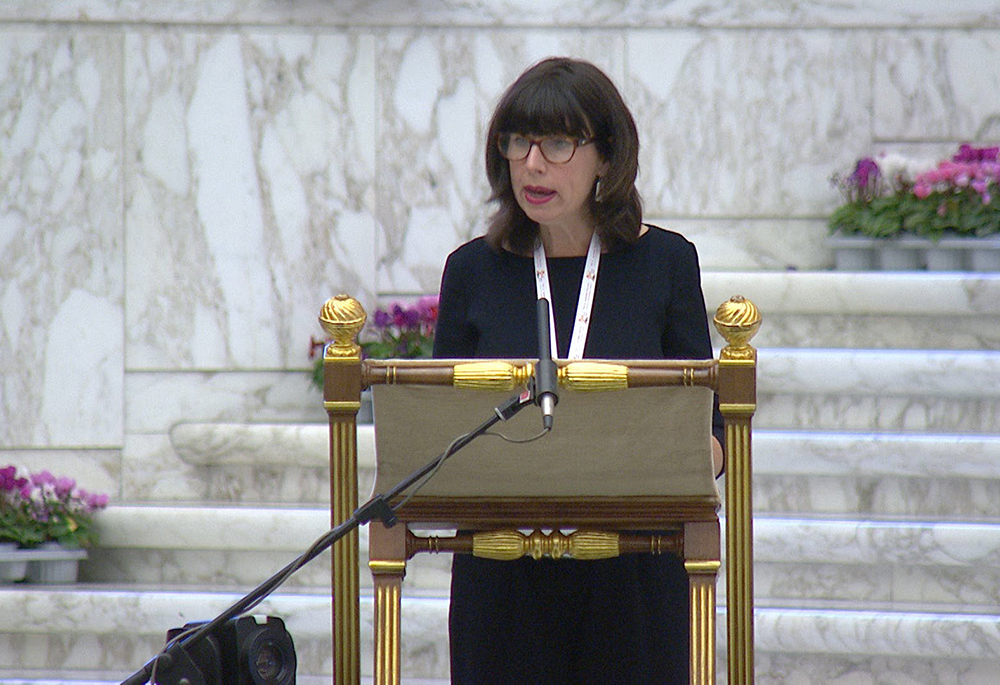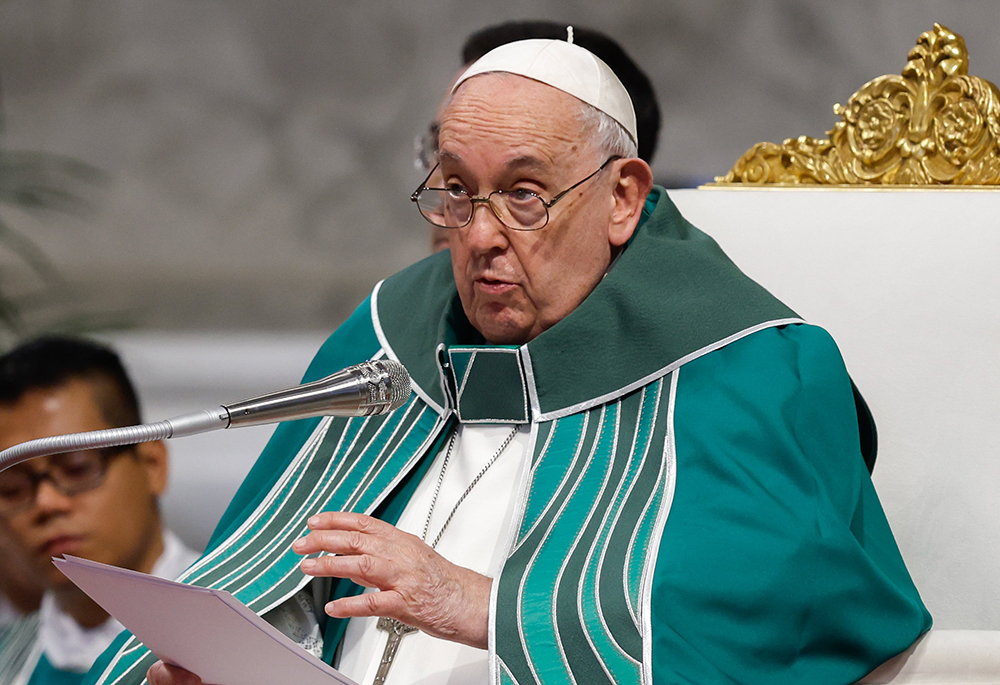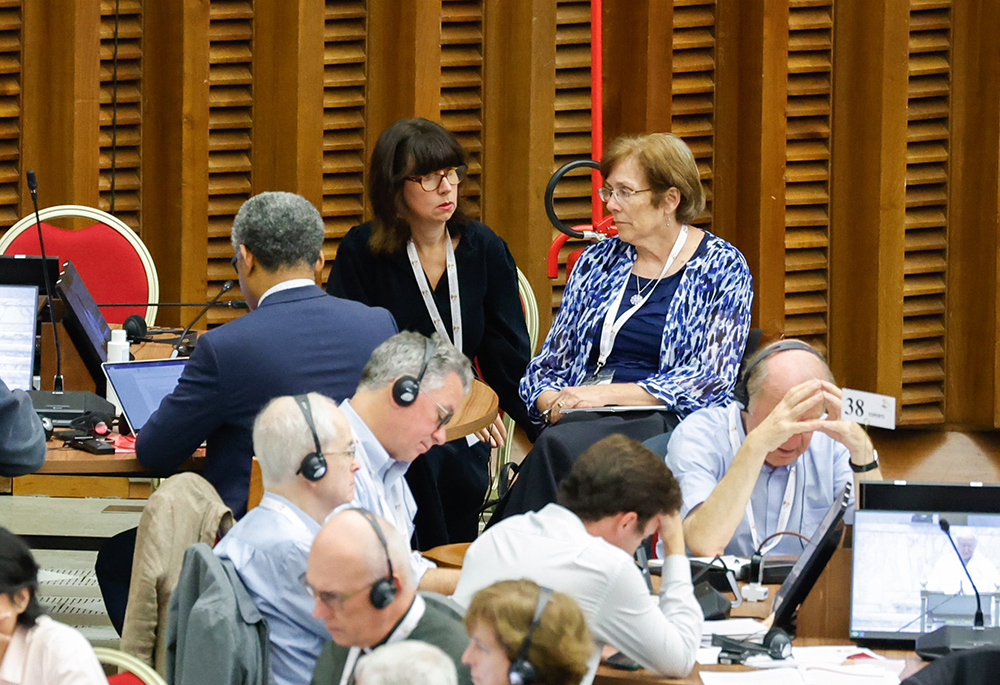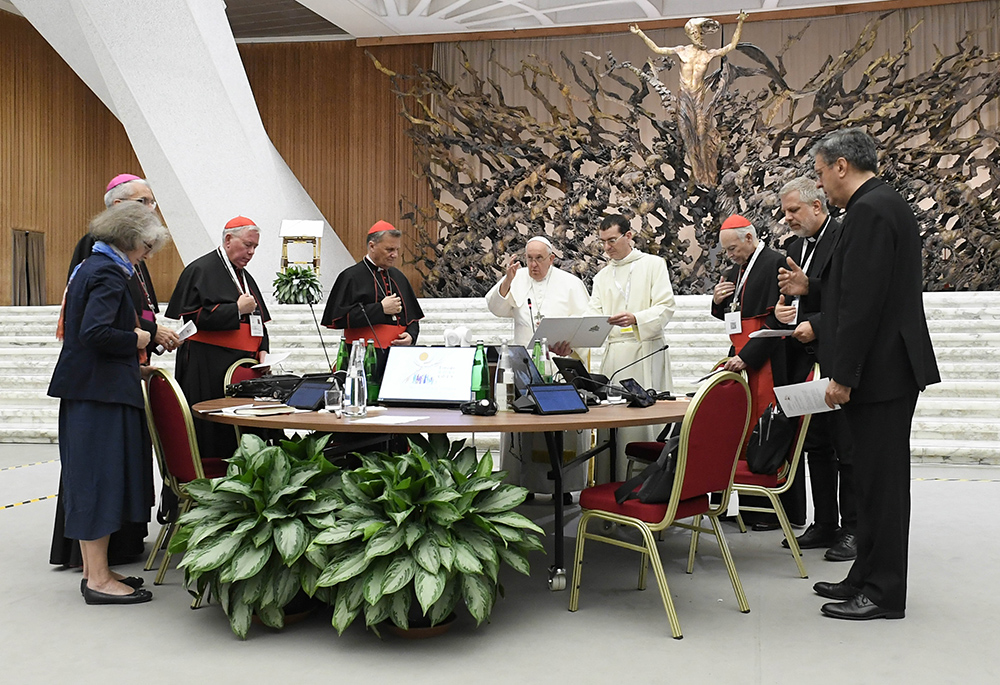
Anna Rowlands, a professor of Catholic social thought and practice at Durham University in England, gives a theological reflection as the assembly of the Synod of Bishops begins work on its section, communion, in this screengrab from Oct. 9, 2023, in the Vatican's Paul VI Audience Hall. (CNS/YouTube/Vatican Media)
A key synod adviser says Pope Francis is more interested in deepening the practice of synodality within the Catholic Church rather than wading into debates over the hot-button issues that have emerged from his major, three-year process to reform the global institution.
"From the beginning, Francis has been more interested in the process of synodal conversation than in the specific issues," said Anna Rowlands, the St. Hilda Professor of Catholic Social Thought and Practice at Durham University in England.
"Rather than attempting to announce synodality, the church, Pope Francis hoped, would grasp it by doing it and no one, in principle, would be excluded," she said.
Rowlands, who is a theological adviser to the Vatican's office for the Synod of Bishops, delivered her remarks during the annual Mary Ward Lecture hosted by the Margaret Beaufort Institute of Theology at Cambridge University on April 17.
Her hourlong address served a sort of "State of the Synod" overview and was among the most sweeping and candid accounts of the process as yet offered by one of its own organizers. The presentation came shortly after the Vatican announced last month the pope had created study groups to consider some of the synod's most controversial issues, which will likely keep the discussions on those issues going past the second assembly of the synod, to be held in Rome this October.
In assessing the multi-year synod on synodality — a three-phased process that began with listening sessions across the globe, followed by continental assemblies and culminating in two sessions in Rome — Rowlands said that the synod process is helping to realize Francis' 2013 apostolic exhortation, Evangelii Gaudium ("The Joy of the Gospel"), which has served as a blueprint for his papacy.

Pope Francis gives the homily at Mass in St. Peter's Basilica at the Vatican Oct. 29, 2023, marking the conclusion of the first session of the Synod of Bishops on synodality. (CNS/Lola Gomez)
In that first major document as pope, Francis declared that he wanted the church to become "mission-oriented" and "to make ordinary pastoral activity on every level more inclusive and open."
According to Rowlands, "If the synod on synodality had been set up in making that vision in Evangelii Gaudium a reality, then its early stages can be judged to have produced remarkable results."
In her analysis, many of Francis' early aspirations in his 2013 exhortation — to invert the ecclessial pyramid to better involve parishes and episcopal conferences in decision-making, the need for better preaching, overcoming abuse of every kind, and renewed pastoral accompaniment of families, among others — have all been surfaced in the synod reports that were produced from almost every episocal conference from the globe.
Rowlands went on to refer to Evangelii Gaudium and the ongoing synod on synodality as "two bookends" of the Francis papacy, now in its 11th year.
The synod, she observed, "enables the dynamic vision" of Evangelii Gaudium "to become a lived reality" in the church, adding that Francis' hope is for the legacy of the synod process to "a more genuine co-responsibility of the baptized for the future of the church."
While acknowledging that she operates as both an outsider and an insider to the synod — as both an autonomous academic theologian who is used to commenting on church affairs but also a "civil servant" to the process — her assessment offered a number of observations on ongoing challenges to the synod, particularly at this juncture in between last October's first session in Rome and the one to come this fall.
In particular, she identified four areas where there is more need for improvement: in participation; the development of better language; resolving issues of power and trust; and the service of theology to the whole church.

Anna Rowlands, left, a theologian from England, attends a working session of the assembly of the Synod of Bishops in the Vatican's Paul VI Audience Hall Oct. 18, 2023. (CNS/Lola Gomez)
Participation and language
Despite the global COVID-19 pandemic and various levels of suspicion about the synod process — and acknowledging that individual participation at the local levels of the process was "lower than hoped and uneven" — Rowlands said that the synod provided an opportunity for many Catholics to have their voices heard and counted for the first time in their lives.
While she praised efforts that prioritized reaching those on the social margins, citing synod listening sessions in refugee camps and prisons, she lamented the fact that many parishes acknowledged that those on the peripheries often proved hardest to engage.
Moreover, she said that parish clergy were the "most marginalized ecclessial group" in the process, citing a range of factors from being overwhelmed with other management responsibilities, to feeling disengaged or skeptical or fearful of speaking freely.
"It is difficult to see how this synodal process can take root as Pope Francis hopes without them," she said, noting that a major meeting in Rome will take place at the end of the month specifically designed to invite an estimated 300 parish priests to offer their voices to the process. "Understanding their silence is critical to any next steps."
While the October 2023 synod assembly managed to achieve new consensus in a number of areas — the need for a better accompaniment of families, renewed formation of priests, better uses of canonical structures to improve decision-making and transparency — Rowlands said it was difficult to find a common language to discuss issues related to human sexuality and gender.
In this regard, she said pastoral issues have given way to ideological fault lines, particularly when it comes to questions of how to better welcome LGBTQ Catholics. On the role of women, she said there remains a "challenge of negotiating the legacy of re-mythologized accounts of sex and gender that have often been used to frame and narrate the question of women's ministerial and vocational roles."
On this front, Rowlands said that finding a better language is an "urgent challenge" for the synod.
Advertisement
Power, trust, theology
Among the other areas of widespread agreement during last fall's first synod meeting in Rome was the shared recognition that there has been a failure to use the church's existing processes and structures in canon law to expand decision-making and governance within church structures.
Rowlands observed that many canon lawyers noted that there are already many mechanisms in place that could help remedy this and that new structures do not necessarily have to be invented, only better utilized.
At the same time, she identified a "crisis of trust" that was mentioned in almost all synod reports related to multiple kinds of abuse within the church, including spiritual, sexual, power and financial. Rowlands went on to describe this as a cross-continental concern raised by both those in the Global North and the Global South.

Pope Francis gives his blessing at the conclusion of the assembly of the Synod of Bishops' last working session Oct. 28, 2023, in the Paul VI Hall at the Vatican. (CNS/Vatican Media)
Under the newly revamped synod model, the monthlong October 2023 Rome meeting took place at roundtables that utilized small group discussions.
While Rowlands praises the depth, dignity and energy of sharing that took place at these tables throughout the month, she said the lack of integration of theologians was a real problem — but not one unique to the synod process.
Instead, she characterized it as an "honest representation of the position of Catholic theology and theologians globally with regards to ecclessial processes."
"This is not a problem invented by the synod, but it is manifesting in the synod," saying it exists in dioceses, episcopal conferences and at the level of the universal church and the synod has put a spotlight on this challenge.
'The pope, instead of trying to sell an idea to the cardinals and trying to cascade it down through documents, invited and convoked the whole world in synod, hoping that we would learn it by doing it.'
—Anna Rowlands, theologian and synod adviser
The synod and church renewal
Looking ahead to the final session of the synod this October and what it will mean for the future of the Catholic Church, Rowlands said that the pope is using synodality as the main mechanism to help further the reception of the Second Vatican Council and a vision of the church that invites greater participation at every level.
While lamenting the "uneven reception" of papal documents by Francis — specifically, his 2015 encyclical on the environment, "Laudato Si', on Care for Our Common Home" and his 2016 exhortation Amoris Laetitia ("The Joy of the Family") — she said that Francis knows that reform does not come top down through documents.
In putting so much stock in the synod, she said she is confident that the synod "has not created new problems or tensions that did not already exist and arguably has proved a hugely positive catalyst for renewal, encounter and mission across the globe, even if unevenly so."
"The pope, instead of trying to sell an idea to the cardinals and trying to cascade it down through documents, invited and convoked the whole world in synod, hoping that we would learn it by doing it," said Rowlands.







